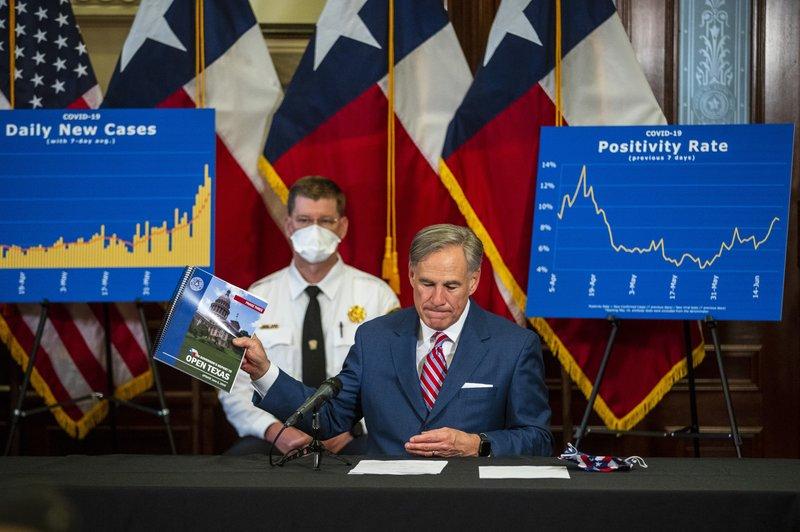Governors who quickly reopened backpedal as virus surges (06/26/20)




Gov. Greg Abbott addresses a news conference at the State Capitol in Austin, Texas, about the coronavirus pandemic Monday, June 22, 2020. Abbott said he has no plans to shut down the state again.. (Ricardo B. Brazziell/Austin American-Statesman via AP)
AUSTIN, Texas (AP) — When Texas began lifting coronavirus restrictions, Republican Gov. Greg Abbott didn’t wear a mask. He wouldn’t let mayors enact extra precautions during one of America’s swiftest efforts to reopen. He pointed out that the White House backed his plan and gave assurances there were safe ways to go out again.
Two months later, a sharp reversal is unfolding as the number of confirmed infections surges.
The backpedaling is not just in Texas, where Abbott ordered bars to shut down again Friday and scaled back restaurant dining and is now urgently telling people to stay home. Arizona Gov. Doug Ducey, also a Republican, did the same, declaring the state “on pause” as hospitals accelerate toward capacity.
As an alarming coronavirus resurgence sets records for confirmed cases and hospitalizations across the U.S. South and West, governors are retreating to measures they once resisted and striking a more urgent tone.





When Texas began lifting coronavirus restrictions, Republican Gov. Greg Abbott didn’t wear a mask. He wouldn’t let mayors enact extra precautions during one of America’s swiftest efforts to reopen. He pointed out that the White House backed his plan and gave assurances there were safe ways to go out again.
Two months later, a sharp reversal is unfolding as the number of confirmed infections surges.
President Trump will not be amused!!!
As an alarming coronavirus resurgence sets records for confirmed cases and hospitalizations across the U.S. South and West, governors are retreating to measures they once resisted and striking a more urgent tone.
The backpedaling is not just in Texas, where Abbott ordered bars to shut down again Friday and scaled back restaurant dining and is now urgently telling people to stay home.
Arizona Gov. Doug Ducey, also a Republican, did the same, declaring the state “on pause” as hospitals accelerate toward capacity.
I think you could still do it, but you need for people to respect the concepts of masks and social distancing. They don't, though.
Good point!
(That's why governor's "recommending" people wear masks isn't nearly as effective as "mandating" it!)
Coronavirus herd immunity number s just don’t add up, Mississippi Governor Tate Reeves says
Donald trump will not be happy with this sort of defiance!
I posted the information on herd immunity below on another thread and how that won't work with Co-Vid 19 and a certain poster just commented on natural immunity and ignored EVERYTHING ELSE.
Alabama governor issues statewide mask order
An order- - and not a "recommendation"?
The Donald will not be a "happy camper" tonight!
https://r.search.yahoo.com/_ylt=A2KLfSVzExFfwuIAQF1XNyoA;_ylu=X3oDMTByNXM5bzY5BGNvbG8DYmYxBHBvcwMzBHZ0aWQDBHNlYwNzcg--/RV=2/RE=1594983412/RO=10/RU=https%3a%2f%2fwww.healthline.com%2fhealth%2fherd-immunity/RK=2/RS=b470rmZSLK..yiAdZqFPNOrgQcY-
What Is Herd Immunity and Could It Help Prevent COVID-19?
You’ve probably heard the term “herd immunity” used in relation to the coronavirus disease outbreak .
Some leaders — for example, Boris Johnson, the prime minister of the United Kingdom — suggested it might be a good way to stop or control the spread of the new coronavirus, which causes COVID-19. Herd immunity is also called community immunity and herd or group protection.
Herd immunity happens when so many people in a community become immune to an infectious disease that it stops the disease from spreading.
This can happen in two ways:
Herd immunity can work against the spread of some diseases. There are several reasons why it often works.
There are also many reasons why herd immunity won’t yet work to stop or slow the spread of SARS-CoV-2 or COVID-19, the disease caused by an infection of the new coronavirus.
When a large percentage of the population becomes immune to a disease, the spread of that disease slows down or stops.
Many viral and bacterial infections spread from person to person. This chain is broken when most people don’t get or transmit the infection.
This helps protect people who aren’t vaccinated or who have low functioning immune systems and may develop an infection more easily, such as:
For some diseases, herd immunity can go into effect when 40 percent of the people in a population become immune to the disease, such as through vaccination. But in most cases, 80 to 95 percent of the population must be immune to the disease to stop its spread.
For example, 19 out of every 20 people must have the measles vaccination for herd immunity to go into effect and stop the disease. This means that if a child gets measles, everyone else in this population around them will most likely have been vaccinated, already have formed antibodies, and be immune to the disease to prevent it from spreading further.
The goal of herd immunity is to prevent others from catching or spreading an infectious disease like measles.
However, if there are more unvaccinated people around the child with measles, the disease could spread more easily because there is no herd immunity.
To visualize this, picture someone without immunity as a red dot surrounded by yellow immune dots. If the red dot can’t connect to any other red dots, there is herd immunity.
The percentage of people that must have immunity to safely slow or stop an infectious disease is called the “herd immunity threshold.”
Natural immunity occurs when you become immune to a specific disease after contracting it. This triggers your immune system to make antibodies against the germ causing the infection inside of you. Antibodies are like special bodyguards that only recognize certain germs.
If you contract it again, the antibodies that dealt with the germ before can attack it before it spreads and makes you ill. For example, if you had chickenpox as a child, you most likely won’t get it again, even if you’re around someone with it.
Natural immunity can help create herd immunity, but it doesn’t work as well as vaccinations. There are several reasons for this:
Herd immunity does work for some illnesses. People in Norway successfully developed at least partial herd immunity to the H1N1 virus ( swine flu ) through vaccinations and natural immunity.
Similarly, in Norway, influenza was projected to cause fewer deaths in 2010 and 2011 because more of the population was immune to it.
Herd immunity can help stop the spread of illness, such as swine flu, and other pandemics within an entire country. But it can change without anyone knowing. Also, it doesn’t always guarantee protection against any disease.
For most healthy people, herd immunity isn’t a good alternative to getting vaccinated.
Not every illness that has a vaccine can be stopped by herd immunity. For example, you can contract tetanus from bacteria in your environment. You don’t contract it from someone else, so herd immunity doesn’t work for this infection. Getting the vaccine is the only protection.
You can help build herd immunity to certain diseases in your community by making sure you and your family have up-to-date vaccinations. Herd immunity may not always protect every individual in the community, but it could help prevent widespread disease.
Social distancing and frequent handwashing are currently the only ways to help prevent you and those around you from contracting and potentially spreading SARS-CoV-2, the virus that causes COVID-19.
There are several reasons why herd immunity isn’t the answer to stopping the spread of the new coronavirus:
Scientists are currently working on a vaccine for SARS-CoV-2. If we have a vaccine, we may be able to develop herd immunity against this virus in the future. This would mean getting the SARS-CoV-2 in specific doses and making sure the majority of the world’s population is vaccinated.
Almost all healthy adults, teens, and older children would need to be vaccinated to provide herd immunity for people who can’t get the vaccine or who are too ill to become naturally immune to it.
If you’re vaccinated and build immunity against SARS-CoV-2, you most likely wouldn’t contract the virus or transmit it.
Herd immunity is community or group protection that happens when a critical number of the population is immune to a certain disease. It can help stop or slow the spread of an infectious disease like measles or swine flu.
The safest way to get immunity is through vaccination. You can also get natural immunity by contracting the illness and building an immune response to it.
Herd immunity isn’t the answer to stopping the spread of SARS-CoV-2, the new coronavirus that causes COVID-19. Once a vaccine is developed for this virus, establishing herd immunity is one way to help protect people in the community who are vulnerable or have low functioning immune systems.
Thanks for that information!